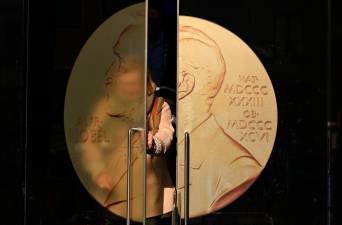STOCKHOLM: The Nobel economics prize concludes the 2025 awards season with its announcement on Monday amid expert predictions favouring artificial intelligence or inequality research.
The prestigious prize winner or winners will be revealed at 11:45 am local time.
Last year’s award honoured Turkish-American Daron Acemoglu and British-Americans Simon Johnson and James Robinson for their work on wealth inequality between nations.
Predicting laureates remains an inexact science due to the secretive nomination and selection process.
Prize watchers nevertheless employ various strategies to identify potential contenders.
Stockholm School of Economics professor Micael Dahlen emphasises reviewing previously recognised disciplines when forecasting winners.
Information economics represents a strong contender according to Dahlen who noted its last recognition came in 2016.
This field has gained significant topical relevance in recent years particularly through artificial intelligence developments.
American economist Erik Brynjolfsson stands as a strong candidate within this field according to Dahlen’s assessment.
Dahlen also suggested Germany’s Monika Schnitzer as a potential laureate for her prominence in international economics.
Public perception potentially influences prize decisions according to some observers.
The committee might also consider American Susan Athey for her exploration of how new technologies transform markets and public policies according to Uppsala University professor Mikael Carlsson.
Women remain significantly underrepresented among economics prize laureates.
Only three women have received the honour among 96 laureates since the prize’s 1969 inception.
Nobody remains insensitive to how decisions are perceived according to Magnus Henrekson of Stockholm’s Research Institute of Industrial Economics.
The 2025 Nobel season has so far recognised two women through American Mary Brunkow in medicine and Venezuelan Maria Corina Machado for peace.
The economics prize uniquely does not belong to the original five awards established in Alfred Nobel’s 1896 will.
The Swedish central bank created the prize through a 1968 donation leading critics to label it a false Nobel.
Alfred Nobel would likely include economics in his will today given its importance for understanding world events and improving societies according to Dahlen.
The Royal Swedish Academy of Sciences selects the economics winner using the same process as the chemistry and physics prizes.
Wealth inequality research could feature prominently in the 2025 edition according to University of Gothenburg researchers.
French-American Emmanuel Saez or France’s Thomas Piketty might receive recognition for their inequality work according to academic assessments.
Their international comparisons and open databases have evidence-based debates and strengthened understanding about tax systems reducing inequality without hampering development according to economics professor Olof Johansson Stenman.
French economist Gabriel Zucman could share the prize with Saez and Piketty as another potential contender.
Zucman’s recent spotlight in France for proposing taxes on the ultra-rich might deter the academy from a potentially controversial choice.
That consideration might discourage them according to Henrekson’s speculation.
Zucman previously won the 2023 John Bates Clark Medal which often precedes Nobel recognition with 17% of recipients later becoming laureates.
Other potential laureates include Belgian Marianne Bertrand and American Sendhil Mullainathan according to prize watchers.
Clarivate research firm spotlighted the duo for their work on racial discrimination and labour economics influenced by psychology and culture.
Swiss economist Ernst Fehr represents another possibility for his behavioural and neuroeconomics specialisation.
Fehr could potentially share the prize with Americans George Loewenstein and Colin Camerer according to some predictions.
Analysts have also mentioned Japan’s Nobuhiro Kiyotaki and Britain’s John Moore for their research on how small shocks affect economic cycles.
The Nobel economics prize includes a diploma, gold medal and US$1.2 million dollar cheque. – AFP
